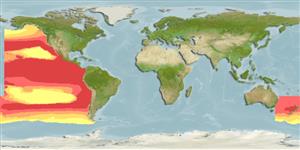>
Lampriformes (Velifers, tube-eyes and ribbonfishes) >
Trachipteridae (Ribbonfishes)
Etymology: Trachipterus: Greek, trachys, -eia, -ys = rough + Greek, pteron = wing, fin (Ref. 45335).
Environment: milieu / climate zone / depth range / distribution range
पारिस्थितिकी
समुद्री; औशिनोड़िरोमस (Ref. 51243). Subtropical
Eastern Pacific: Alamitos Bay in southern California, USA to Chile.
आकार / वज़न / Age
Maturity: Lm ? range ? - ? cm
Max length : 143 cm TL पुल्लिंग / अलिंग; (Ref. 2850)
Short description
पहचान कुंजी | आकृति विज्ञान | मौरफोमैटरिक्स
पृष्ठीय रीढ़ (सम्पूर्ण) : 0; पृष्ठीय सौफट रेज़ (सम्पूर्ण) : 153 - 174; गुदा कांटा: 0; ऐनल सौफट रेज़: 0; जानवरों की रीड़ का जोड़: 69 - 72.
Oceanic. Found at or near surface at night, deeper during the day. Oviparous, with planktonic eggs and larvae (Ref. 36610).
Life cycle and mating behavior
Maturities | पुनरुत्पत्ति | Spawnings | Egg(s) | Fecundities | लार्वा
Eschmeyer, W.N., E.S. Herald and H. Hammann, 1983. A field guide to Pacific coast fishes of North America. Boston (MA, USA): Houghton Mifflin Company. xii+336 p. (Ref. 2850)
IUCN Red List Status (Ref. 130435)
Threat to humans
Harmless
Human uses
साधन
Special reports
Download XML
इंटरनेट स्रोत
Estimates based on models
Preferred temperature (Ref.
123201): 11.5 - 28.6, mean 22.3 °C (based on 180 cells).
Phylogenetic diversity index (Ref.
82804): PD
50 = 0.5166 [Uniqueness, from 0.5 = low to 2.0 = high].
Bayesian length-weight: a=0.00102 (0.00046 - 0.00225), b=3.06 (2.88 - 3.24), in cm total length, based on all LWR estimates for this body shape (Ref.
93245).
Trophic level (Ref.
69278): 3.7 ±0.4 se; based on size and trophs of closest relatives
लौटाव (Ref.
120179): निम्न, न्यूनतम जनसंख्या दुगनी होने का समय 4.5 - 14 वर्ष। (Preliminary K or Fecundity.).
Fishing Vulnerability (Ref.
59153): Very high vulnerability (86 of 100).
